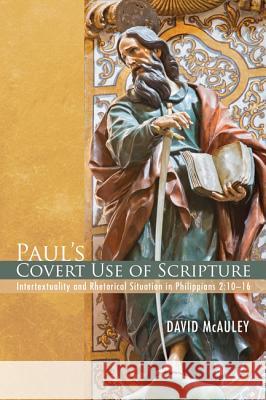Paul's Covert Use of Scripture » książka
Paul's Covert Use of Scripture
ISBN-13: 9781498221139 / Angielski / Miękka / 2015 / 308 str.
Paul's Covert Use of Scripture
ISBN-13: 9781498221139 / Angielski / Miękka / 2015 / 308 str.
(netto: 161,28 VAT: 5%)
Najniższa cena z 30 dni: 169,34
ok. 16-18 dni roboczych.
Darmowa dostawa!
This book explores why and how Paul uses Scripture (Old Testament) in Phil 2:10-16. It tests the suggestion that a cluster of tacit references to specific books of Scripture is integral or foundational to Paul's epistolary argument. If the problem in Philippi is the disinclination to accept suffering and death as intrinsic to gospel citizenship, then the muted allusions lead to a single, central theme: ""God's approval of suffering and death for the sake of Christ."" McAuley argues this theme is the crucial intertext that unifies and gives significance to the whole letter. Previous scholarly efforts to discover congruence between the contexts of Philippians and the Old Testament have rested on a heuristic approach focused on surface-level themes and ""facticities"" recorded in Paul's text, leading to mixed results. In this investigation McAuley sets forth a new theoretical and exegetical framework that draws on insights from theories of intertextuality, allusion, and rhetorical situation to offer a fresh interpretation of Philippians. ""This stimulating book offers fresh insights into why Paul wrote his letter to the Philippians and makes a significant contribution to current debates on Paul's use of Scripture. Highly recommended."" --Steve Moyise, Visiting Professor, Newman University, Birmingham ""Enquiry into Paul's use of Scripture is a well-plowed furrow. In this volume, McAuley makes a fresh contribution to this debate by drawing attention to a neglected passage in a neglected epistle. As a consequence, Philippians can now make a contribution, in its own right, to this very important aspect of Pauline hermeneutics."" --Dr. Andrew D. Clarke, University of Aberdeen "" A] remarkably researched book. . . . His use of the English language is outstanding--nearing C. S. Lewis in his articulation. . . . This is a first-class offering of modern scholarship with no shortcuts. McAuley digs deep into a narrow passage of Scripture and finds unity in Paul's thought and coherence with shafts of prophetic insight found in the Old Testament."" --Tony Sargent, International Chairman, Elam Ministries Asia; Former Principal, International Christian College, Glasgow; Professor of Practical Theology, Olivet University, San Francisco David McAuley is a visiting lecturer in New Testament, and itinerant preacher. He earned his BSc in computing from the University of the West of Scotland, Paisley, his BA in theology from International Christian College, Glasgow, and his PhD in divinity from the University of Aberdeen. Before undertaking theological study, he worked for IBM in engineering, consultancy, and management.
This book explores why and how Paul uses Scripture (Old Testament) in Phil 2:10-16. It tests the suggestion that a cluster of tacit references to specific books of Scripture is integral or foundational to Pauls epistolary argument. If the problem in Philippi is the disinclination to accept suffering and death as intrinsic to gospel citizenship, then the muted allusions lead to a single, central theme: ""Gods approval of suffering and death for the sake of Christ."" McAuley argues this theme is the crucial intertext that unifies and gives significance to the whole letter. Previous scholarly efforts to discover congruence between the contexts of Philippians and the Old Testament have rested on a heuristic approach focused on surface-level themes and ""facticities"" recorded in Pauls text, leading to mixed results. In this investigation McAuley sets forth a new theoretical and exegetical framework that draws on insights from theories of intertextuality, allusion, and rhetorical situation to offer a fresh interpretation of Philippians.""This stimulating book offers fresh insights into why Paul wrote his letter to the Philippians and makes a significant contribution to current debates on Pauls use of Scripture. Highly recommended.""--Steve Moyise, Visiting Professor, Newman University, Birmingham ""Enquiry into Pauls use of Scripture is a well-plowed furrow. In this volume, McAuley makes a fresh contribution to this debate by drawing attention to a neglected passage in a neglected epistle. As a consequence, Philippians can now make a contribution, in its own right, to this very important aspect of Pauline hermeneutics.""--Dr. Andrew D. Clarke, University of Aberdeen""[A] remarkably researched book. . . . His use of the English language is outstanding--nearing C. S. Lewis in his articulation. . . . This is a first-class offering of modern scholarship with no shortcuts. McAuley digs deep into a narrow passage of Scripture and finds unity in Pauls thought and coherence with shafts of prophetic insight found in the Old Testament."" --Tony Sargent, International Chairman, Elam Ministries Asia; Former Principal, International Christian College, Glasgow; Professor of Practical Theology, Olivet University, San FranciscoDavid McAuley is a visiting lecturer in New Testament, and itinerant preacher. He earned his BSc in computing from the University of the West of Scotland, Paisley, his BA in theology from International Christian College, Glasgow, and his PhD in divinity from the University of Aberdeen. Before undertaking theological study, he worked for IBM in engineering, consultancy, and management.











